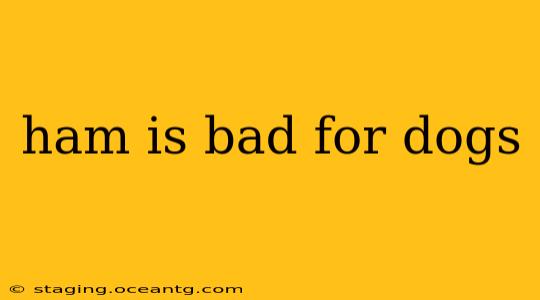Ham, a beloved holiday staple for many families, presents a potential hazard to our canine companions. While the irresistible aroma might tempt your furry friend, feeding them ham can lead to various health problems. This comprehensive guide delves into why ham is considered bad for dogs, exploring the potential dangers and offering safer alternatives for treating your beloved pet.
Why is Ham Bad for Dogs?
The primary reason ham is unsuitable for dogs lies in its high fat and sodium content. Processed ham, in particular, often contains excessive amounts of both, potentially causing serious health issues. Let's break down the specifics:
High Fat Content: Ham, especially cured and processed varieties, is incredibly rich in fat. This can lead to pancreatitis, a severe and potentially life-threatening inflammation of the pancreas. Symptoms of canine pancreatitis include vomiting, diarrhea, lethargy, abdominal pain, and fever. In severe cases, it requires immediate veterinary intervention.
High Sodium Content: The high sodium content in ham poses another significant risk. Excessive sodium intake can lead to sodium ion poisoning, resulting in symptoms like vomiting, diarrhea, increased thirst, and excessive urination. In severe cases, it can cause seizures and even death.
Other Potential Dangers: Beyond fat and sodium, ham can also contain added preservatives, nitrates, and nitrites, which are not suitable for canine consumption. These additives can further exacerbate digestive upset and, in some cases, lead to more serious health problems. Bones present in ham can also cause choking or internal injuries if ingested.
What Happens if My Dog Eats Ham?
The consequences of your dog consuming ham depend on several factors, including the amount consumed, the type of ham (processed vs. cooked), and your dog's overall health and size. Small amounts of lean, cooked ham might not cause immediate problems in a healthy adult dog, but it’s still best avoided.
However, larger quantities, especially of processed ham, can quickly lead to the issues mentioned above: pancreatitis, sodium ion poisoning, and digestive upset. If you suspect your dog has ingested a significant amount of ham, monitor them closely for symptoms like vomiting, diarrhea, lethargy, or excessive thirst. Contact your veterinarian immediately if you observe any concerning signs.
Can Dogs Eat Cooked Ham?
While cooked ham might seem safer than raw ham, it still carries the risks associated with high fat and sodium content. The cooking process doesn't eliminate these harmful components. Therefore, even cooked ham should be avoided as a regular treat or part of your dog's diet.
Are There Any Safe Alternatives to Ham for My Dog?
Absolutely! Many healthier and equally delicious treats are available for your canine companion. Consider offering:
- Plain cooked chicken or turkey breast: Lean protein sources provide essential nutrients without the harmful fats and sodium of ham.
- Carrots, green beans, or apples (in moderation): These vegetables and fruits offer a healthy and tasty snack.
- Dog-specific treats: Numerous commercially available dog treats are formulated to provide balanced nutrition and avoid harmful ingredients.
Always consult your veterinarian before introducing any new food into your dog's diet.
What should I do if my dog ate a lot of ham?
If your dog has consumed a significant amount of ham, especially processed ham, immediate veterinary attention is crucial. The high fat and sodium content can quickly lead to serious health problems. Don't hesitate; contact your vet immediately.
Is Ham Bone Bad for Dogs?
Yes, ham bones are extremely dangerous for dogs. They can splinter easily, causing internal injuries, choking hazards, and potentially fatal obstructions in the digestive tract. Never give your dog ham bones.
In conclusion, while the allure of ham might be strong, it's crucial to prioritize your dog's health and well-being. Avoiding ham and opting for safer, healthier alternatives ensures a long and happy life for your furry friend. Remember, always consult your veterinarian with any concerns regarding your dog's diet or health.
